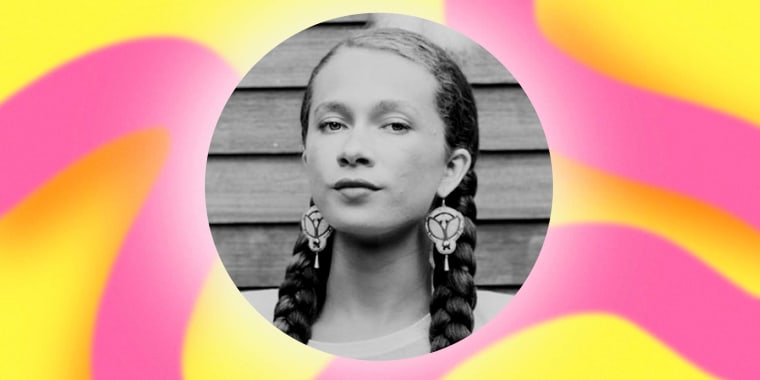In honor of Pride Month, NBC Out is highlighting and celebrating a new generation of LGBTQ trailblazers, creators and newsmakers. Visit our full #Pride30 list here.
Sherenté Mishitashin Harris says the most controversial act they ever committed is being themselves.
An Indigenous, Two Spirit youth leader, they have broken barriers in traditional dancing. Harris, who uses gender-neutral pron0uns, is a member of the Narragansett tribe, who are descendants of the aboriginal people of Rhode Island.
Harris, 21, once danced in the tradition of their father, a war dancer, and then, after having come out as Two Spirit, began dancing in the tradition of their mother at age 16. They spent one year learning the Fancy Shawl dance, a modern dance created during the women’s rights movement, under their mother’s tutelage, who taught Harris that what makes a Fancy Shawl dancer is carrying yourself with grace.
“This dance is a dance of liberation,” they said in a 2019 TEDx talk. “Not just for me but for the entire LGBT community. And for that reason I have gone out and danced, in the face of those who feel that I should not.”
Harris said that while they are known as a dancer, they really see themselves as a storyteller. They come from the Turtle clan, which is traditionally a storytelling clan.
“Grandmother Turtle is the oldest and wisest of all of the creatures, and therefore she carries the traditions of our people on her tongue,” they said.
Harris said they tell the stories of their people, and especially of Two Spirit people, because “these are the histories that have been overlooked, have been intentionally forgotten or rewritten over. Our invisibility is one of the most pernicious things that has allowed us to remain under the heel of oppression.”
“Until our neighbors see us, they can’t aid us as allies,” Harris added.
There is a tenant of Narragansett worldview that is translated to, “All our beloved relations,” and it means all of creation is a family, and Earth is the mother of all things.
“When you recognize everything in the world around you as your relation, you treat it as if it is inextricably connected to you. It is part of you,” Harris said. “That is traditionally the role that Two Spirit people played within our communities: to remind people that even the most seemingly distant of things — light and darkness, the day and the night, men and women — that we are all connected, and the Two Spirit person embodies that.”
Dancing at ceremonies and powwows serves as a reminder of the concept of connectedness, Harris said. The drum symbolizes the heartbeat of Mother Earth, and moving in time to the drum means moving in time with all of creation. They dance in a circle with no beginning and no end. The dance also serves as a prayer, and Harris said they wouldn’t be giving thanks for what makes their life beautiful if they weren’t able to dance in a style that speaks to who they are as a Two Spirit person.
Harris comes from a family of world champion dancers. Their mother has toured globally and danced at the second inauguration of President Bill Clinton. Their father is a world champion Eastern war dancer, the highest honor given at the largest powwow. The war dance tells the story of the hunt, while the Fancy Shawl dance is a modern one created during the women’s liberation movement. It is characterized by spins, kicks and twirls, and requires moving one’s feet in an intricate pattern. Each dancer tries to get as high on their toes as possible.
Though Harris’ family supported them, there was some backlash in the community when Harris first began dancing the Fancy Shawl dance at a competition. They were told they could not compete. They danced anyway.
Support for them swelled, and, later, the tribal council came to Harris’ home and apologized for the discrimination that occured. Now, Harris continues to dance the Fancy Shawl dance and has gained global support for their work.
“We see our traditions not as static things, but as living things. Like all living things, it must grow and change,” Harri said.
